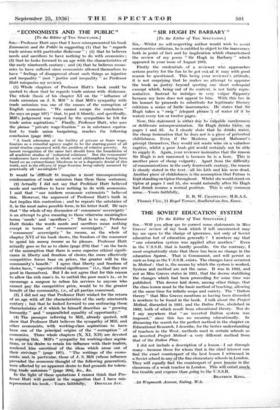SIR,—Will you , R1JOWtn correct some. statements in Miss Graves' review
My* bOok which if left uncorrected may lay me open to- the Charge of ignorance, not only of Soviet education but of education generally ? I nowhere Say that " One education system was applied after another." Even in the ILS.S.R. that is, hardly possible. On the contrary, I most emphatically state that there has been no change in the education System.- That is Communist, and will persist as such as Long as the U.S.S.R. exists. The changes have occurred in Method ; that is, the means by which the system is worked. t System and Method are not the same. It Was in 1932, and not' as Miss Graves states in 1931, that the decree' stabiliSing the changes which had been proceeding for 'sortie time was Published. This decree laid-down, 'among other things,' that the class lesson must be the basic method of teaching, allowing at the same time for infinite scope and variety. The " Dalton theory" that Miss Graves mentions as haVing been discarded is nowhere-to be found in the book. I talk about the Project' Method, discarded in 1931, and the Dalton Plan, abblislied in 1982, both of which result from educational thetity; Nor do I say anywhere that " an inverted Dalton- Osten', was imposed," since this has no meaning Cdticationally. In discussing the search for the perfect method-in the-chapter on Educational Research, I describe, for the better understanding of teachers in the West, methods used in certain Schools as an inverted Project Method—a very different method from
that of the Patton Plan. - - . ,
I did not include a description of a lesson-=I sat through Many—because those for whom that is the chief interest can find the exact counterpart of the ,hest lesson I_ witnessed in a Soviet school in any of the fine elementary schools 40.4onflon. They will equally. find the counterpart .of poor, lessons in the classroom of a weak teacher in London. This WHIT entail much,
less trouble and expense than going to the U.S.S.R.. .


















































 Previous page
Previous page